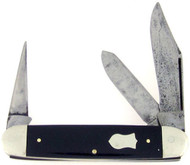Antique Knife Collecting
Posted by American Edge on Feb 21st 2020
Antique knife collecting can be a great hobby. Before you get started, you want to begin by doing your research and learning about quality knives so you don’t get swindled. You may decide to be a generalist and collect an assortment of knives in different styles, or you may choose to focus on a specialized area of knives, such as handmade custom knives, pocketknives, or knives from a specific factory/brand.
In order to be considered antique, a knife must be at least 100 years old. Collectible knives are often new, but they may be of a later vintage than antique knives. In that case, both collectors and dealers must refer to them as vintage. Knife collecting has been popular since the 19th century, though we saw a big boom of custom knife collections in the later 1960s. It wasn’t until the 1940s that knife collecting organizations began popping up.
You may start a collection in one of two ways. Some individuals decide to just start collecting knives that they like, and then they start building up their knowledge about knives and how to grow their collection. Others prefer to gain knowledge on the subject before they make their first purchase. Individuals take pleasure in the art of collecting knives, from the selection process, to properly storing them. Knives are revered for their artistic beauty, craftsmanship, and significance. Some people plan out their collections and develop a style—sometimes called planned collecting—while others prefer to collect as they go. You can spend as little as $5 on a knife, or some have spent upwards of $100,000 on one art knife. However, antique Bowie knives can come with an even higher price tag, with some models selling for over $200,000. If you decide to collect knives of this price range, it’s especially important to learn how to insure them and to clean and store them properly.
Knife collectors may learn more about the art of knife collection via magazines, by attending knife shows and seminars, or by reading knife collecting books. Some collectors even take seminars on knife-making. Collector clubs are offered on the local, national, and international level.


